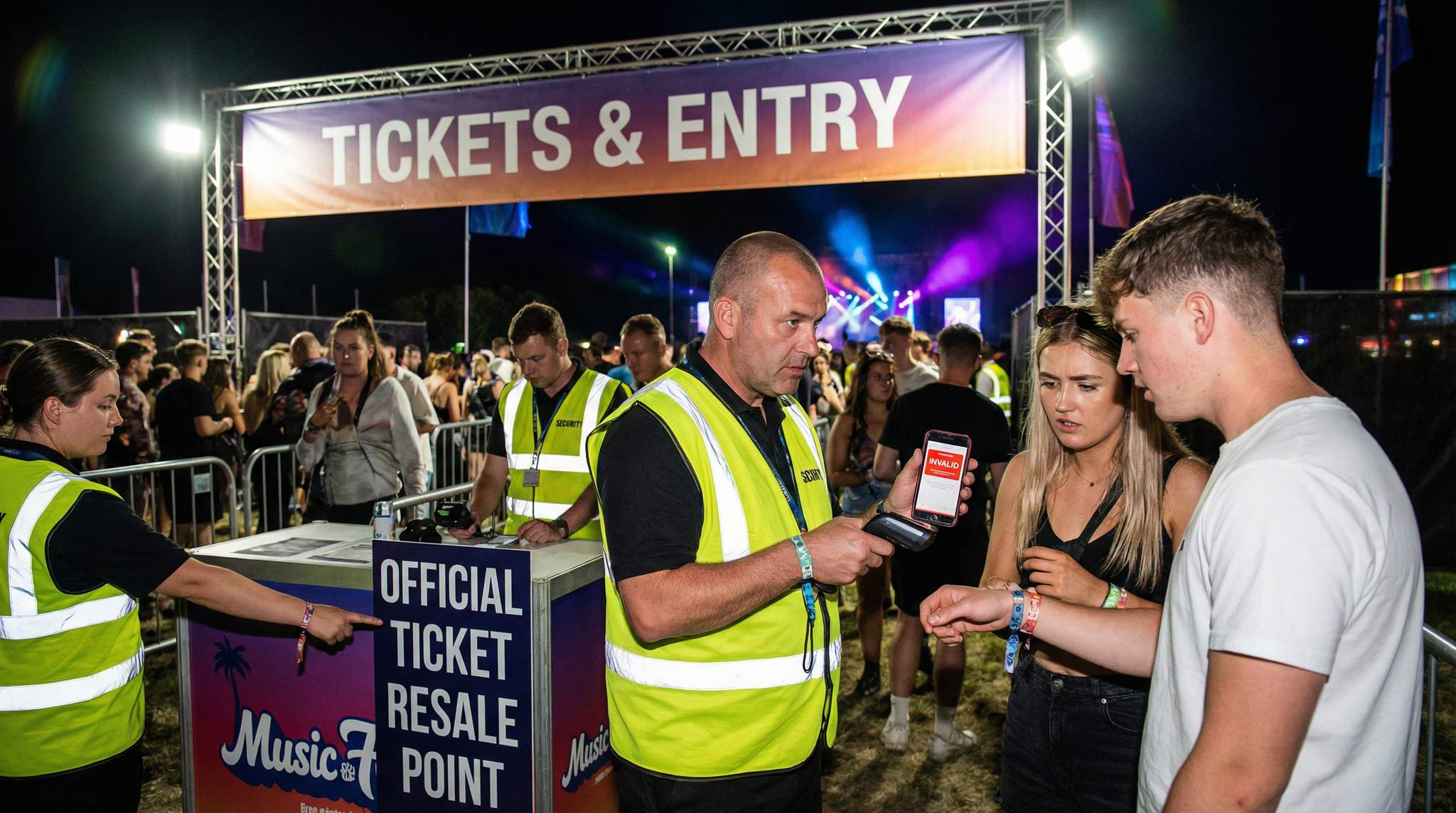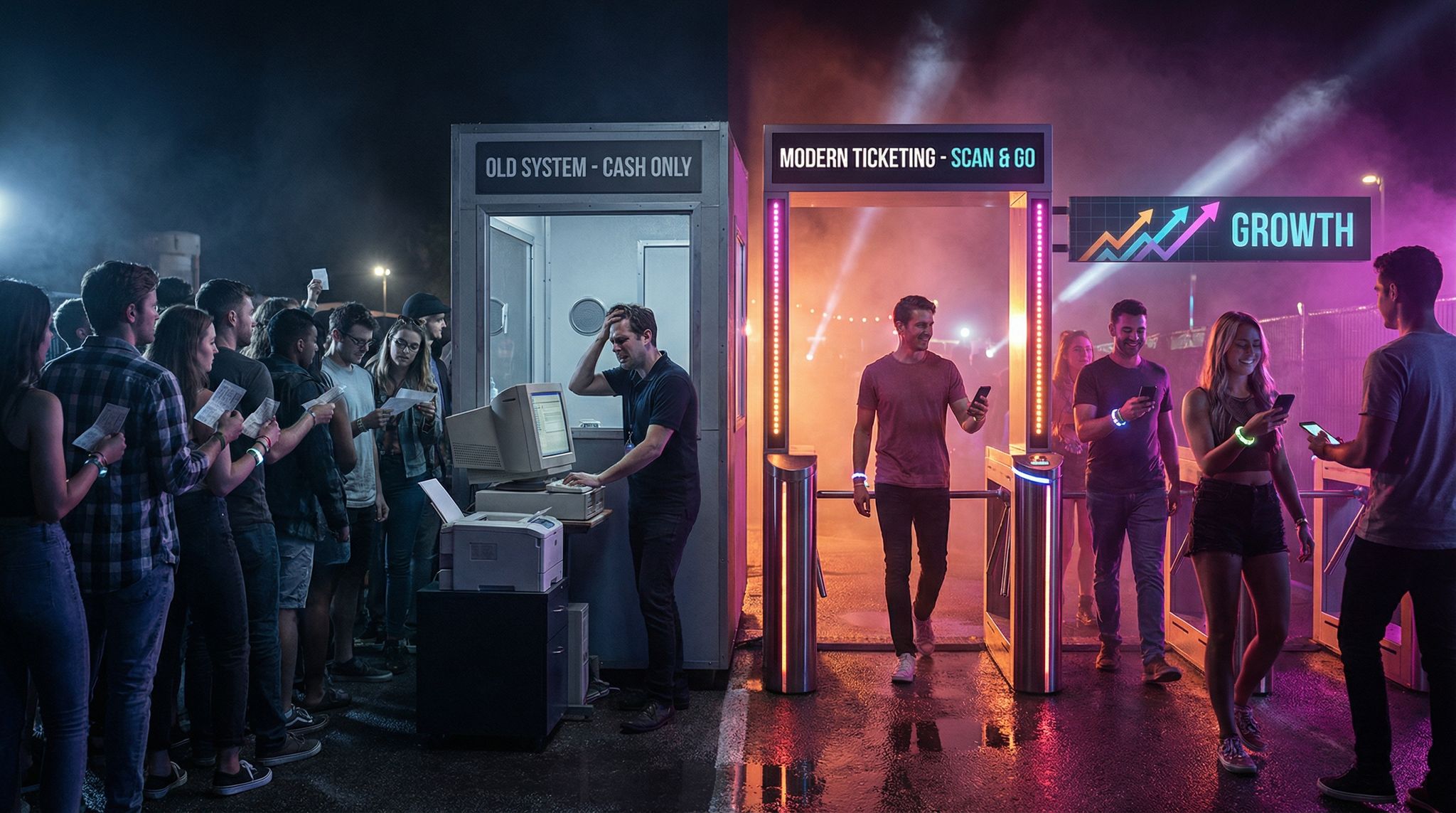The Dark Side of Ticketing: Fraud and Scalping
Ticket fraud and scalping represent the dark side of the festival experience, threatening both revenue and attendee trust. Scammers and opportunistic resellers exploit high demand by any means necessary – from bots snatching up tickets in seconds, to counterfeit passes sold at exorbitant prices. The scope of the problem is huge – studies estimate nearly 5 million people buy fake tickets each year, resulting in millions in lost revenue and untold heartbreak for fans stripped of their money and excitement. The result? Genuine fans are left frustrated or locked out, and those who do get tickets may pay far above face value for the privilege. No region or genre is immune: whether it’s an EDM festival in Las Vegas or a boutique cultural fest in Singapore, the risk is real. Every festival organizer must take this threat seriously; failing to combat fraud and scalping can lead to unhappy attendees, negative press, and long-term damage to your event’s reputation.
Impact on Festivals and Fans
When scalpers and fraudsters interfere with ticket sales, festivals suffer in multiple ways:
- Priced-Out Fans: True supporters can be shut out when resale prices skyrocket or bulk buyers hoard inventory. This undercuts the inclusive spirit of festivals and means some events might technically sell out, yet end up with empty spots because real fans were priced out.
- Fraud Victims at the Gate: Counterfeit or invalid tickets leave would-be attendees stranded and upset on event day. Fans who fall victim to fake tickets lose their money and miss the show – and their disappointment often turns into anger directed at the festival organizers. Entry staff then have to handle these emotional confrontations, which can create chaos at the gates.
- Reputation Damage: News of widespread ticket scams or blatant scalping can seriously hurt a festival’s brand. An event known for unfair ticket access might see fans hesitate to buy tickets in the future, fearing they’ll either be outbid by bots or ripped off by fakes. Trust, once lost, is hard to regain.
For example, high-profile concert tours have been marred by scalping bots flooding the system, leaving thousands of loyal fans empty-handed. These scenarios illustrate how vital it is for organizers to be proactive in preventing ticket fraud and scalping. Some unlucky fans even showed up with counterfeit tickets purchased via secondary markets, only to be denied entry. These scenarios illustrate how vital it is for organizers to be proactive in preventing fraud and scalping.
Use Secure, Hard-to-Fake Tickets
One of the most effective defenses is to make your tickets as secure and tamper-proof as possible. Modern ticketing technology offers several tools to ensure only legitimate tickets can gain entry:
Keep Tickets in Fans' Hands
Our secure resale marketplace lets attendees exchange tickets at face value, eliminating scalping while keeping you in control of the secondary market.
- Unique Barcodes/QR Codes: Each ticket should carry a one-of-a-kind barcode or QR code that gets electronically validated at entry. Once scanned, the code is marked as used so it cannot be reused. Advanced ticketing systems even generate dynamic QR codes that refresh periodically or become invalid after one scan, making it nearly impossible for anyone to copy or share a ticket illegally (a static screenshot, for instance, would be useless once the code updates).
- RFID Wristbands or Smart Tickets: Many festivals now issue RFID-enabled wristbands or smart tickets. RFID chips embedded in wristbands carry encrypted ticket data and are extremely hard to clone. At the gate, attendees simply tap their wristband on a scanner for instant verification. Each wristband’s chip is linked to the original buyer’s account, ensuring authenticity. If someone tries to copy a wristband, the system will flag it as invalid. RFID also prevents “pass-back” fraud (one person trying to sneak in multiple people with one pass) because the system can deactivate a wristband once it’s scanned for entry.
- Secure Physical Tickets & Credentials: If your festival uses physical tickets or paper credentials (for VIP passes, staff badges, etc.), incorporate hard-to-forge elements: holographic foils, special inks, watermarks, or microprinting. These features make it obvious when a ticket is a cheap copy. While physical tickets are less common today for general admission, don’t overlook security for any printed materials you do use.
By deploying secure ticket technology, you not only thwart basic scams (like photocopying tickets or sharing QR screenshots) but also speed up admissions. Fans appreciate a smooth, secure check-in that ensures everyone inside legitimately paid to be there. It shows the festival cares about protecting their investment and experience.
Anti-Bot Protection for Online Sales
Most scalping schemes start long before the festival gates open – they begin online, the moment tickets go on sale. Scalpers deploy automated bots to snap up large quantities of tickets in seconds, aiming to resell them at a markup. To fight back, festival producers need robust anti-bot protections in their ticket sales process:
Planning a Festival?
Ticket Fairy's festival ticketing platform handles multi-day passes, RFID wristbands, and complex festival operations.
- CAPTCHAs and Human Verification: Implement tests like CAPTCHAs, puzzles, or click-to-confirm prompts at checkout to ensure a human is behind each purchase. This simple step trips up many basic bots. Some advanced systems also analyze mouse movements or keystroke patterns to distinguish bots from real fans.
- Virtual Queues & Throttling: For high-demand on-sales, use a virtual waiting room or queue system to control traffic. A queue prevents bots from overwhelming your website by giving each prospective buyer a fair place in line. Modern queue tools can detect and filter out known bot behavior, keeping the process more orderly and human-scaled.
- Purchase Limits and Account Requirements: Limit the number of tickets that can be bought per transaction or per customer (for example, no more than 4–6 tickets per person). Also consider requiring customers to create an account and sign in to buy tickets, possibly even with a verified email or SMS code. This adds a layer of friction that slows down mass bot purchases. Sophisticated scalpers might create many fake accounts, but combining account login with other checks (like one purchase per credit card or IP address) can weed out a lot of bad actors.
- Anti-Bot Detection Software: Work with a ticketing platform that invests in bot-detection and fraud analytics. For instance, some platforms monitor real-time purchasing patterns and automatically block suspicious activity – such as dozens of tickets bought within milliseconds, or multiple transactions coming from one IP address. These systems often maintain databases of known scalper IPs, credit card numbers, and other red flags to proactively bar them. Ticket Fairy’s own ticketing platform, for example, employs such measures to ensure tickets go to real fans and not automated scripts.
Real-world lesson: Even major ticketing companies have faced public outrage when bots nabbed a huge share of tickets for coveted events, leaving genuine fans empty-handed. This highlights the importance of preventing fraud and scalping and ensuring that leaving would-be attendees stranded doesn’t happen to your event. Without anti-bot protections, no event is too big to be immune. By prioritizing bot defense, you safeguard your festival’s integrity and ensure more tickets end up in the hands of true fans rather than resellers.
Consider Personalized Tickets and ID Checks
A more stringent (but powerful) tactic to combat scalping is to issue personalized tickets – i.e. print the buyer’s name on each ticket (or encode it in the RFID) and require matching ID at entry. This approach, used by some of the world’s most in-demand festivals and concerts, can virtually eliminate third-party scalping because a ticket becomes non-transferable without the organizer’s approval.
- Scalping Deterrent: When each ticket is tied to a specific person’s identity (and sometimes even their photograph, as done by a few legendary festivals in Europe), it’s extremely hard for scalpers to profit. Even if touts manage to buy tickets in bulk, they can’t resell them unless they also somehow fake or transfer the original buyer’s identity – essentially impossible. Knowing that IDs will be checked at the gate discourages scalpers from even trying, since any ticket that doesn’t match a valid ID will be refused entry.
- Logistical Considerations: The downside is that ID checks take time and coordination. Verifying each person’s name against their ticket can slow down entry lines, especially at a large festival. Attendees must be informed well in advance to bring proper ID and expect this procedure. To keep lines moving, you’ll likely need extra staff and clearly marked lanes (for example, dedicated lanes for people with personalized tickets to get their IDs checked efficiently). Technology can help here too – handheld scanners that display the ticket holder’s name, or even photo, to the staff can streamline verifications.
- Flexible Transfer Policy for Fans: Life happens – what if someone buys a ticket and then can’t attend due to an emergency or change of plans? Strict “no transfer at all” rules can backfire by angering genuine fans who have a legitimate reason to give their ticket to a friend or sell it. To balance security with compassion, offer a controlled way to transfer tickets ahead of the event. For instance, you might allow a one-time name change service up to a certain date (perhaps for a small admin fee or under specific conditions), or provide an official mechanism for fans to return tickets for a refund or exchange (more on that in the next section). By having a formal process, you maintain the deterrent against illicit resale while giving real ticket buyers a safety valve for unforeseen circumstances.
Personalized ticketing is best suited for high-demand events where scalping has been a major problem and where your community of fans is likely to appreciate the fairness trade-off. A famous example is Glastonbury Festival (UK) – since the mid-2000s, Glastonbury has required fans to pre-register with a photo ID before buying tickets, and each ticket comes printed with the buyer’s name and photograph. A turning point came in 2007 when they decided to ensure the rightful ticket owner is present. It’s a drastic measure, but it virtually wiped out scalping for that event and fans ultimately supported it to stop ticket touting and embrace Glastonbury’s photo ID registration system. Other festivals like Tomorrowland in Belgium have also adopted personalized, non-transferable tickets, and many concerts in Asia now use real-name ticketing as well to combat touts. If you decide to go this route, be prepared to communicate clearly with your audience about why you’re doing it and how it works – and be ready to invest in the customer service support needed to manage ID checks and ticket transfers smoothly.
Official Resale and Transfer Options
No matter what anti-scalping measures you put in place during the initial sale, there will always be cases where fans legitimately need to sell or transfer their tickets later (due to illness, travel issues, etc.). If you don’t provide a safe, official channel for this, those transactions will likely move to the black market, which opens the door for scalpers and fraudsters to step in. Offering an official resale or ticket transfer system is a win-win for organizers and fans alike:
Smooth Entry With Mobile Check-In
Scan tickets and manage entry with our mobile check-in app. Supports photo ID verification, real-time capacity tracking, and multi-gate coordination.
- Fan-to-Fan Resale Marketplace: Set up a platform (or use a ticketing service that has one built-in) where ticket holders can resell their tickets to other fans under your oversight. The key is to control the price and authenticity. Ideally, resales should be allowed only at face value or with a very modest markup cap (to account for fees or minor price increases). By capping resale prices – say, no more than 10-15% above the original price – you remove the profit motive for scalpers. If nobody can make a huge profit reselling a ticket, there’s little incentive for professional touts to hoard them in the first place.
- Verified Ticket Transfers: Ensure that any approved resale or transfer goes through your official system so that a brand-new ticket (with a new unique barcode/QR code or re-encoded RFID) is issued directly to the new owner. Simultaneously, the original ticket should be cancelled and marked invalid. This way, the person receiving the ticket gets a fresh, valid ticket in their own name or account, and the original copy can’t be used anymore. Many modern ticketing platforms support one-click transfers – for example, the original buyer just hits “Transfer Ticket” and enters the new recipient’s email, and the system handles reissuing the ticket seamlessly. This ensures the chain of custody for each ticket is always tracked and under your control, which prevents situations like one ticket being sold to multiple people.
- Waitlists for Sold-Out Events: Another fan-friendly approach is to offer a waitlist for interested buyers once tickets sell out. Fans who missed the initial sale can sign up for a waitlist, and if tickets become available (perhaps due to cancellations or refunds), those fans are notified and given the first opportunity to purchase the returned tickets at face value. Some ticketing systems (including Ticket Fairy) even automate this process: when a ticket gets refunded or returned, the next person on the waitlist receives an alert and a limited-time window to buy the ticket at the standard price. This not only rewards patient fans, but also undercuts scalpers by providing an official route to satisfy late demand.
By facilitating official resales and transfers, you show your audience that you care about fair access and you’re actively keeping the ticket exchange above-board. Fans will be less tempted to turn to sketchy unofficial sellers if they know there’s a trustworthy way to buy or sell a spare ticket. Plus, it helps you maintain an accurate handle on who is attending the event, since you’ll know the rightful owner of each ticket even if it changed hands. Ticketing platforms like Ticket Fairy include built-in resale and transfer features that ensure any resold ticket is authenticated and traceable within the system – ensuring late buyers get genuine tickets and protecting fans from fake tickets when they didn’t get a ticket initially – giving peace of mind to both organizers and fans that no fake or price-gouged tickets are circulating.
Tip: Resist the temptation to combat scalpers by simply raising your own ticket prices drastically (so-called dynamic pricing). While surging prices to match demand might squeeze scalpers’ margins, it often alienates your fanbase, who feel they’re being gouged by the event itself. It’s usually better to keep prices fair and stable, and use the methods above to manage resales, rather than resorting to pricing gimmicks that can erode trust.
Educate Attendees and Communicate Policies
Technology and strict policies are crucial, but there’s another powerful tool in the fight against ticket fraud: education. An informed fan is much less likely to be swindled by a scammer or to inadvertently support scalpers. Festival organizers should communicate clearly, early, and often about their ticketing policies and anti-fraud measures:
- “Buy Tickets Only From Official Sources”: Make it absolutely clear who your authorized ticketing partners or outlets are. Plaster this message on your website’s ticket page, in email newsletters, and across social media: for example, “The only valid tickets are those purchased through [Your Festival’s Official Site] or via our official resale platform.” Encourage attendees not to trust any deals that seem too good to be true on unofficial marketplaces. When fans know exactly where to get legitimate tickets (and where not to), scammers have a much harder time deceiving them.
- Explain How to Spot Fakes: Give your ticket buyers tips on verifying ticket authenticity. If you use physical tickets or printable PDFs, tell fans about the security features (holograms, special inks, unique QR codes, etc.) so they know what a real ticket looks like. If you use e-tickets or mobile app tickets, clarify whether screenshots or printouts are accepted – many festivals using dynamic QR codes will not accept a static screenshot, and fans should know that. By educating your audience on what a legitimate ticket should look like and how the entry process works, you empower them to steer clear of anything that doesn’t fit the mold.
- State Your Resale Policy Up Front: Whatever rules you’ve set – whether tickets are non-transferable, or transferable only through the official resale platform by a certain date – make sure these are well advertised before and after purchase. On the ticket purchase page, in confirmation emails, and on your FAQ section, be crystal clear: e.g. “Tickets are non-transferable except via our official resale exchange. Any ticket sold elsewhere may be voided.” This not only deters would-be scalpers (who know their listings could be cancelled), but also warns fans that if they buy off an unauthorized seller, they risk being denied entry. No one likes surprises at the gate.
- Regular Warnings and Updates: As the event approaches, use your communication channels to remind fans about potential scams. For instance, post on social media like: “? Watch out for fake tickets – recently we’ve seen bogus offers on Facebook. Remember, only tickets bought through our site or officially transferred are valid.” Many scams prey on last-minute desperation, so a week or two before the festival, send a reminder email and social posts about staying safe from ticket fraud. By keeping the topic on people’s radar, you reduce the chance of fans being duped.
- Fan Support and Reporting: Encourage your community to report any suspicious ticket offers or counterfeit activity they come across. Set up a quick-response help channel for ticketing issues where fans can ask, “Is this site legitimate?” or report scalpers. If a fan tries to sell a ticket on your official Facebook event page, for example, politely remind them and everyone else of the rules (and delete such posts if they violate policy). Having a visible stance against scalping – and backing it up with action – will signal to everyone that you’re serious about protecting fans.
Finally, ensure your own team is well-versed in these policies. Train your customer service and on-site staff on how to advise attendees regarding ticket authenticity and what to do if they encounter a suspected fake. When your whole organization is aligned and communicating the same anti-fraud message, fans will get the picture loud and clear.
Stay Vigilant: Monitor and Enforce
Implementing anti-fraud measures isn’t a “set and forget” task. Ongoing vigilance is required to keep tickets in the hands of real fans. Even after your primary sale is done, keep an eye on secondary markets and be prepared to enforce your policies:
- Monitor Resale Platforms and Social Media: Regularly scout popular resale websites and social media groups for any mention of your festival’s tickets. If you find people reselling passes at jacked-up prices or see an influx of sketchy listings (“100 tickets available!”), take action. Many major resale sites will cooperate with event organizers to remove listings that violate your terms of sale or local laws (for example, some countries prohibit reselling above face value). Likewise, if you spot scalpers or scammers trying to prey on fans in comment threads or fan forums, issue a public warning. A quick post like “We’re aware of fake tickets being sold on XYZ site – avoid them and only trust our official resale page” can prevent fans from getting burned.
- Invalidate Illicit Tickets: If your ticketing system allows, you can preemptively void tickets that are being sold improperly. Some advanced platforms can flag and automatically cancel tickets that appear on unauthorized resale sites for inflated prices. By invalidating a scalped ticket, you make it impossible for the scalper’s buyer to use it – effectively rendering the scalper’s “product” worthless and discouraging the practice. (If you do this, be sure to publicize that you’re doing it! The fear of buying a ticket that turns out canceled is often enough to drive fans back to official channels.)
- Enlist Authorities When Needed: Large-scale, organized ticket fraud isn’t just an internal problem – it can be illegal. Don’t hesitate to involve law enforcement or pursue legal action for serious cases. Many countries have begun cracking down on ticketing fraud and bot usage. In the US, the BOTS Act makes it unlawful to use automated bots to buy tickets, and regulators have prosecuted offenders. In the UK, dedicated trading standards teams have even secured jail sentences for professional ticket touts who sold tickets for millions of pounds. While you may not need to go this route for small infractions, knowing that you can and will escalate serious fraud sends a strong message.
Staying vigilant post-onsale protects your festival’s community. The faster you can shut down a scam or scalping attempt, the fewer fans will be affected. In one recent instance, a major anticipated reunion tour saw hundreds of fake tickets pop up online within hours of the ticket release – proving that speed is essential to stop fraud – a nightmare scenario for any organizer. Swift action, like getting those listings removed and warning your fans, is essential. By actively policing the secondary market and enforcing your rules, you not only protect fans and your festival’s revenue, but also broadcast a clear warning to would-be scammers: this festival takes fraud seriously, and we will stop you.
Conclusion: A Fair Festival for All
Preventing ticket fraud and scalping requires a multi-layered approach – there’s no single magic solution, but rather a combination of technology, smart policy, and proactive communication. By plugging the holes at every step of the ticket’s journey – from the moment of purchase to the scan at the gate – you drastically reduce the chances of bad actors exploiting your event. The good news is that fans will notice and appreciate these efforts. When true music lovers have a fair chance to buy tickets at a reasonable price, it builds goodwill that money can’t buy. On the flip side, taking a hard stance against scalpers and scammers preserves your festival’s long-term reputation and viability. Attendees remember when an event looks out for them.
From Los Angeles to London to Sydney, festival organizers around the world are innovating to stay one step ahead of fraudsters. Secure ticketing tech, anti-bot measures, personalized tickets where appropriate, official resale channels, and strong fan education all work in concert to keep ticket sales fair. While you may never eliminate 100% of scams, by using every tool available you’ll mitigate the risks to a minimum. That means fewer headaches on show day, no massive crowds of duped ticket-holders at the gate, and maximum trust from your community. In the end, a fair and secure ticketing process isn’t just good ethics – it’s good business. Protect your ticket revenue, protect your fans, and set the stage for a successful festival where the only thing your attendees have to worry about is having an amazing time.
Need Festival Funding?
Get the capital you need to book headliners, secure venues, and scale your festival production.





